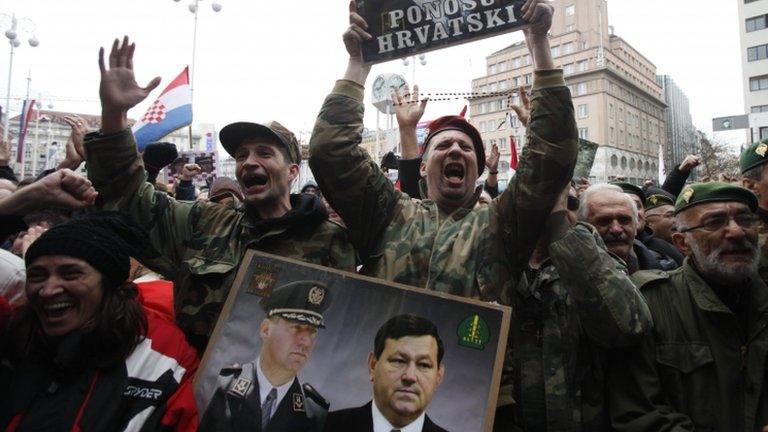ICTY Hague court in turmoil amid claims of manipulation
- Published

The court set up to make sure the worst Balkans war criminals faced justice is under unprecedented scrutiny.
Critics say recent changes at the court in The Hague - perhaps made under political pressure - have allowed several top suspects to walk free.
Last week an email reportedly written by a Danish judge emerged that claimed external forces were manipulating the court - the International Criminal Tribunal for the former Yugoslavia (ICTY) - to protect themselves from future investigations.
One of the recent cases causing concern is that of Franko Simatovic and Jovica Stanisic - two of the highest-ranking Serbian state officials to appear before the tribunal accused of war crimes.
They established and trained the feared Serb paramilitary squads that terrorised non-Serbs in Bosnia and Croatia, and provided the weapons that were used to unlawfully kill them.
But, last month, they were found not guilty and acquitted on all counts.
'Burden of proof'
The majority of judges decided that there was insufficient evidence to be sure they acted with criminal intentions.
Some lawyers with experience at the ICTY say this is an example of a case in which the evidence would formerly have been sufficient to reach a conviction - and that there has been a fundamental change of the court's interpretation.
Lawyer Karijn van der Voort, who worked on the Simatovic case, explains: "There has been a shift in the burden of proof required, especially relating to aiding and abetting."
She says the change was first apparent in the case of Momcilo Perisic, the Yugoslav army commander acquitted on appeal in February this year after initially being sentenced to 27 years in prison.
"The Perisic appeals chamber… stated that if an organisation committed lawful and unlawful acts, if someone assisted that organisation in any way, you had to prove that the actions of the accused were specifically directed towards the criminal acts of the organisation," says Ms van der Voort.
The Yugoslav Tribunal has come under scrutiny
Critics also point to the overturned conviction, in November 2012, of Croatian generals Ante Gotovina and Mladen Markac, who led an operation against Serbs in Croatia's Krajina region.
In earlier cases generals and politicians were convicted on the principle that they were part of a "joint criminal enterprise" with the thugs carrying out massacres on the ground.
Nenad Golcevski, from the Humanitarian Law Center, says recent rulings have undermined the court, which many in the region hoped would be an instrument for recognition and reconciliation.
"It has lost respect, it has lost credibility, in the region and internationally. We feel as though the rug has been pulled from beneath us."
Dark forces?
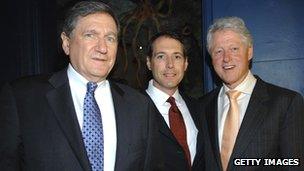
Under the old rules, Richard Holbrooke and Bill Clinton "could have been convicted"
The implications of these verdicts may go beyond the borders of the Balkans.
As US President Barack Obama considers whether to arm the Syrian rebels, lawyers say the legal basis for holding anyone to account for aiding and abetting those responsible for committing atrocities may have been defined just in time.
They say it will ensure the US or any other states that wish to intervene cannot be held responsible for any acts that violate international law if they did not "specifically direct" that the weapons should be used to commit the crimes.
Peter Robinson, the Californian lawyer currently representing Bosnian Serb leader Radovan Karadzic at the ICTY, says: "It allows the US and UK and other people who want to intervene on the side of the rebels not to fear that they would be prosecuted if the rebels go ahead and commit crimes with some of the arms or funds that are provided for them."
"Under aiding and abetting the way it was, they could have convicted [former US President] Bill Clinton, [US diplomat] Richard Holbrooke. They all authorised weapons to go to the Bosnian Muslims at a time when they knew they were committing crimes - so it needed to be reined in a little bit."
For some, the credibility of the court has been further called into question by an email reportedly written by an ICTY judge, Frederik Harhoff of Denmark, in which he said fellow judges were apparently coming under pressure to reach an acquittal.
'Conspiracy theories'
The British barrister Geoffrey Nice, who was prosecutor in the case against former Serbian President Slobodan Milosevic, is leading calls for an investigation.
"It is at least possible that the US and or countries like the UK were frightened of the consequences for their countries (although there has never been any suggestion of improper pressure by the UK government that I have heard of)."
He says there are concerns that the recent judgements may now provide grounds for appeal against earlier convictions.
The BBC asked for either the ICTY president, prosecutor or press office to respond to the allegations against the court. All requests have been rejected.
But Luka Misetic, who defended Croatian General Ante Gotovina, has little time for what he calls "conspiracy theories".
"When people don't get the judgements they want, they say the only reason it can be is politics," he says. "The judgements aren't consistent to support this, I see little evidence to support them."
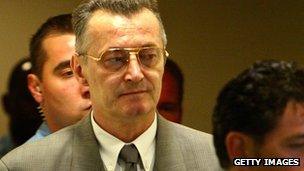
Franko Simatovic set up paramilitary groups but was found not responsible for their actions
And a professor of law at Leiden University, Dov Jacobs, agrees.
"Those trials were, for many people, always meant to just confirm guilt.... Now there are acquittals in the recent cases," he says.
"They think the moral agenda, the moral aim of finding guilt, is not being achieved."
But legal experts say changes in how the law is being interpreted will effectively allow those at the top to avoid liability.
Lawyer Karijn van der Voort says: "By raising the bar so high, it is making the top people almost impossible to convict."
And Satko Mujagic, who was imprisoned at Omarska, one of the most notorious Serb detention centres, calls it "a slap in the face for the victims".
"You cannot admit that these people founded the forces that committed the mass war crimes over a period of four years and then conclude it is not their fault," he says.
"What does that tell Serbs now? That they did nothing wrong."
- Published30 May 2013
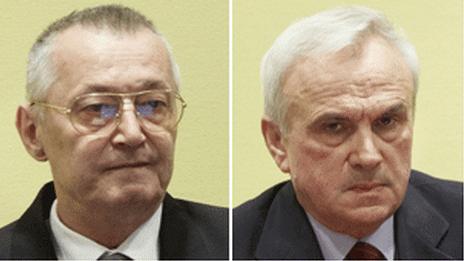
- Published18 March 2016
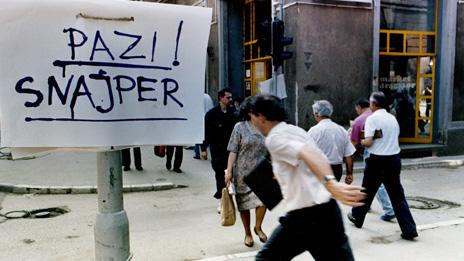
- Published29 April 2013
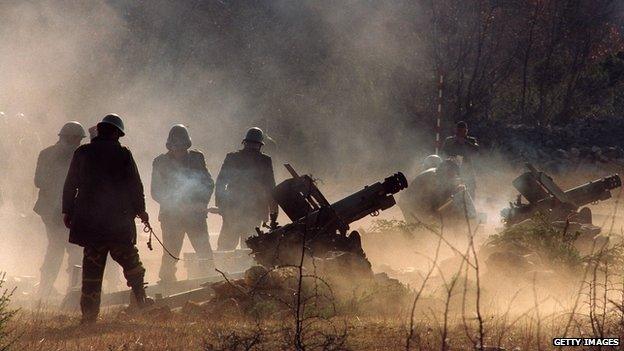
- Published28 February 2013
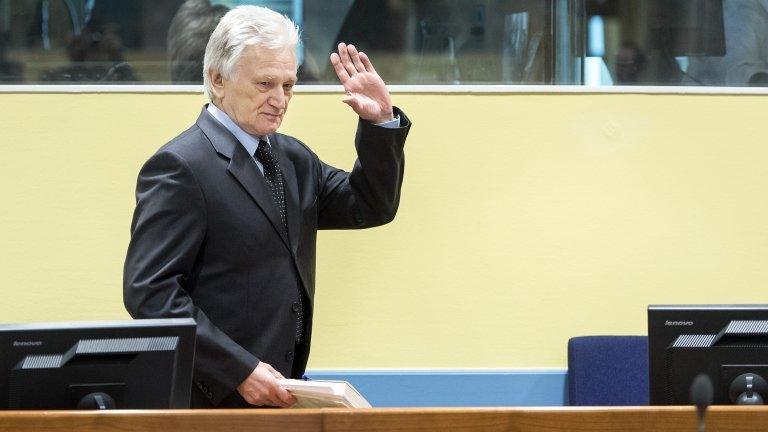
- Published28 February 2013
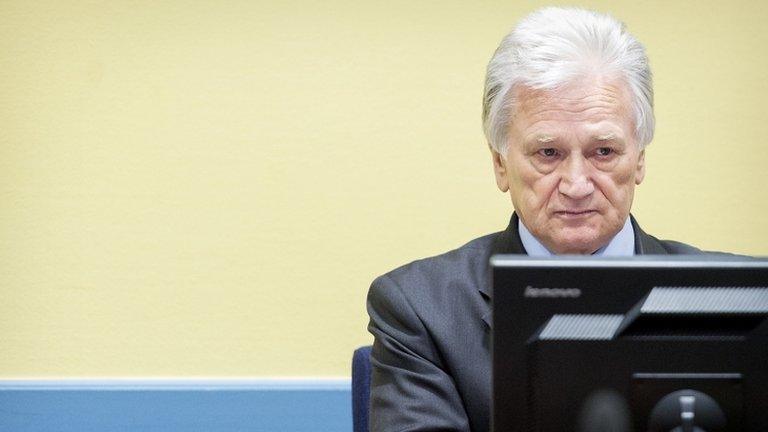
- Published17 November 2012
